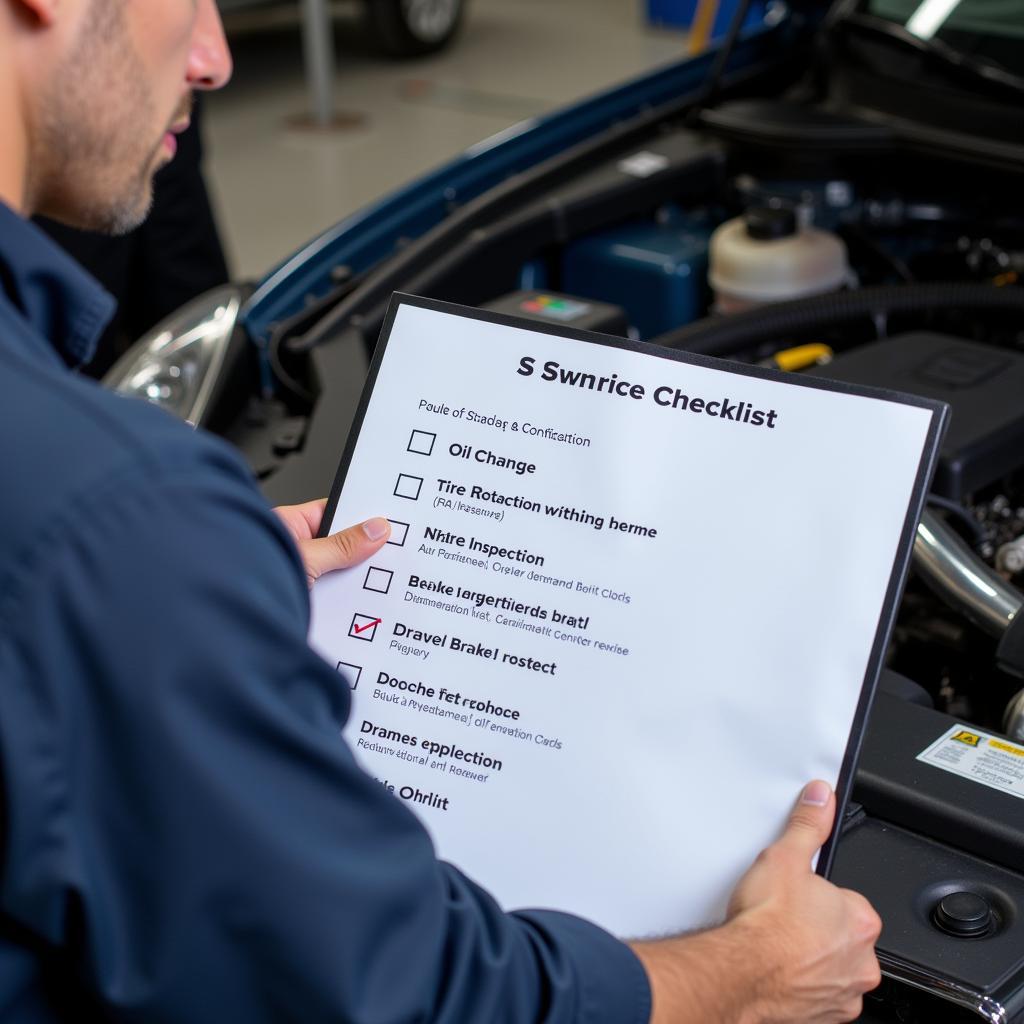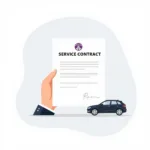When you hear the phrase “car service,” what exactly comes to mind? It can mean different things to different people, but essentially, it’s all about keeping your car running smoothly and safely. But what exactly does that entail? This guide delves into the nitty-gritty of car services, outlining everything you need to know to keep your vehicle in peak condition.
Understanding Car Service Intervals
Car service isn’t a one-size-fits-all affair. Service intervals depend on several factors, including:
- Make and Model: Different vehicles have different manufacturing specifications and recommended maintenance schedules.
- Driving Conditions: City driving, off-road adventures, and frequent towing can impact your car’s service needs.
- Mileage: Your owner’s manual outlines specific services at certain mileage intervals.
Essential Car Service Components
While specific services vary, some core components are generally included in most routine car services:
1. Oil and Filter Change
This is the cornerstone of car maintenance. Engine oil lubricates moving parts, reduces friction, and prevents overheating. Regular oil changes with the recommended oil grade ensure your engine’s longevity.
2. Fluid Level Checks
Your car relies on various fluids like coolant, brake fluid, power steering fluid, and transmission fluid. Mechanics check their levels and top them off to maintain optimal performance and prevent component damage.
3. Tire Inspection and Rotation
Tire health is crucial for safety and fuel efficiency. Mechanics inspect tires for wear and tear, proper inflation, and damage. They also rotate tires to ensure even tread wear, extending their lifespan.
4. Brake System Check
Brakes are arguably the most critical safety feature of your car. A comprehensive check includes inspecting brake pads and discs for wear, checking brake fluid levels, and testing overall brake responsiveness.
5. Battery Assessment
Your car battery provides the initial power to start the engine. Mechanics check the battery’s voltage and terminals for corrosion to ensure it’s in good working order.
6. Air Filter Replacement
The air filter prevents dust, debris, and contaminants from entering the engine. A clogged air filter restricts airflow, reducing engine performance and fuel economy.
7. Belts and Hoses Inspection
Your engine relies on various belts and hoses for functions like power steering, air conditioning, and alternator operation. Inspecting them for cracks, wear, and proper tension helps prevent unexpected breakdowns.
Beyond the Basics: Additional Car Service Options
Besides routine maintenance, several specialized services cater to specific needs:
- Tune-Up: This involves adjusting engine timing, spark plugs, and fuel mixture for optimal engine performance.
- Transmission Service: This includes fluid changes and filter replacements to ensure smooth gear shifting and prevent transmission problems.
- Cooling System Flush: This involves removing old coolant and replacing it with fresh coolant to prevent overheating and corrosion.
The Importance of Following Manufacturer Recommendations
While this guide offers a general overview, always refer to your vehicle’s owner’s manual for manufacturer-recommended service intervals and specific requirements.
Recognizing When Your Car Needs a Service
Ignoring your car’s service needs can lead to costly repairs and safety hazards. Watch out for these telltale signs:
- Unusual noises like squealing, grinding, or knocking
- Warning lights on your dashboard
- Fluid leaks under your car
- Decreased fuel efficiency
- Vibrations or pulling to one side while driving
Car Service and Your Warranty
Sticking to your car’s scheduled maintenance plan ensures your warranty remains valid. Keep all service records organized as proof of maintenance.
FAQs: What’s Included in Car Service?
1. How often should I service my car?
Generally, it’s recommended to service your car every 6 months or 7,500 miles, whichever comes first. However, always refer to your owner’s manual for specific recommendations.
2. What’s the difference between a basic and full car service?
A basic service typically includes an oil change, fluid top-ups, and visual inspections. A full service is more comprehensive and includes additional checks and replacements like air filters and spark plugs.
3. Can I service my own car?
While some routine maintenance tasks can be done at home, it’s always best to leave more complex procedures to qualified mechanics, especially if your car is still under warranty.
4. How much does a car service cost?
The cost varies widely depending on the type of service, your car’s make and model, and the location. However, regular servicing can save you money in the long run by preventing major repairs.
5. Why is it important to choose a reputable car service provider?
A reputable mechanic will use quality parts, have qualified technicians, and offer fair pricing. They’ll also provide you with transparent communication about your car’s needs.
Finding a Trustworthy Mechanic: Tips from the Experts
” Choosing a reliable mechanic is crucial for your car’s well-being,” says John Smith, a seasoned automotive expert with over 20 years of experience. “Look for certifications, ask for recommendations, and don’t hesitate to get a second opinion.”
What is included in a service of as car
Conclusion: Investing in Your Car’s Longevity
Regular car service is an investment, not an expense. By adhering to a consistent maintenance schedule and addressing issues promptly, you’ll ensure your vehicle’s reliability, safety, and longevity while enjoying a smoother ride.
Need expert car service advice? Contact us via WhatsApp: +1(641)206-8880 or Email: [email protected]. Our team is available 24/7 to answer your questions and assist you in finding the best solutions for your car’s needs.



